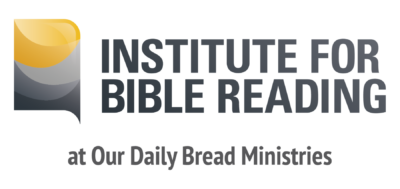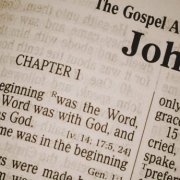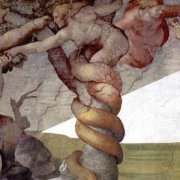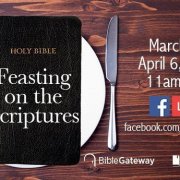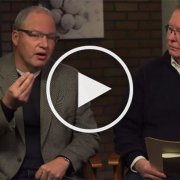An Ezra Moment: Returning to Our Story During COVID-19
Around 538 B.C., the nation of Israel limped home. After seventy years of Babylonian captivity, they returned to Judah to find Jerusalem in ruins. The wall was torn down, the gates destroyed. The Temple was little more than a pile of rubble. Nehemiah weeps when he learns of the condition of the city.
The people are disoriented. The glory days of David and Solomon are long gone and their once world-class city is a shell of its former self. They rebuild the temple, and those old enough to remember the glory of the first temple weep tears of mourning. Nehemiah rebuilds the walls and gates surrounding the city, but reality bites. The once-proud superpower has been reduced to a third-rate nation with no king, no army, and no treasury.
Then something amazing happens. Once the basic infrastructure is set up, the people come to Ezra, their chief priest, with a request.
“In October, when the Israelites had settled in their towns, all the people assembled with a unified purpose at the square just inside the Water Gate. They asked Ezra the scribe to bring out the Book of the Law of Moses, which the Lord had given for Israel to obey.”
Although the walls and the temple were standing again, the people sensed that something was still broken: themselves. They believed that healing would come through re-immersion in their Story. Ezra responded immediately by organizing corporate day of Scripture reading.
“He faced the square just inside the Water Gate from early morning until noon and read aloud to everyone who could understand. All the people listened closely to the Book of the Law.”
Church in the Age of Coronavirus
The COVID-19 virus hardly needs an introduction. Over the last few weeks our lives and habits have been upended. Words like “crisis” and “pandemic” flood our thoughts and our imaginations. We’re isolated, cut off from our friends and loved ones, unable to even gather on Sundays to worship.
Our pastors are scrambling to create infrastructure with which to “do church” during these strange and unsettling times. We can be grateful for their leadership and creativity, and for online platforms like Zoom that allow us to see the faces of our church family, if only in pixels and bytes.
Even with technology helping us piece together a vague sense of community, we are still entering a difficult season. Infectious disease specialist Michael Osterholm has said that while many are viewing the crisis as a “blizzard” that must be waited out with extreme measures for a short period of time, the more appropriate response is to view it as the “beginning of winter.” While the ultimate severity and longevity are unknown, many indicators point toward a likely scenario: things are going to be different for a while.
In their moment of uncertainty and disorientation, the nation of Israel turned to their Scriptures to remember their identity, to recount God’s promises and his rescue, and to be reminded of the kind of people they were called to be. During the winter of coronavirus, could the Body of Christ do something similar?
Returning to our Story
Shaken from our usual routines and frenetic pace, the virus has given the church an opportunity to evaluate. What can “church” look like during this time? Like Israel we’re faced with a bit of a blank slate. Like Israel we can choose to return and re-focus on our founding story told in the Scriptures. A modern-day Ezra Moment, if you will.
To help, we’ve created Immerse From Home, a completely free downloadable resource that includes everything you need to (virtually) gather in community for a two-week book club reading of Luke-Acts.
- The full digital text of Luke-Acts in the Immerse reader-friendly format
- A two-week reading plan
- Four open-ended conversation starters for your group
- Accompanying resources including audio, video, and Family Guide
- A step-by-step guide on setting up and running video meetings through Zoom
Originally intended as Volume 1 and Volume 2 of the same combined story, Luke-Acts comprises a quarter of the New Testament. In a period of uncertainty and anxiety, what could be more orienting and grounding than the story of Jesus and the story of the early church?
If you and your group enjoy the Luke-Acts experience, you can continue reading the New Testament together using Tyndale House Publishers’ 20% discount off of Immerse: Messiah.
The Beginning of Something New
In his wisdom, Ezra understood that an emotional one-off event wasn’t sufficient and that he needed to create a comprehensive plan for sustainable rhythms of immersion in the sacred texts. The Scripture Reading Marathon became a turning point for the nation, but only because it was a starting point.
Nehemiah goes on to tell us:
“On October 9, the family leaders of all the people, together with the priests and Levites, met with Ezra the scribe to go over the law in greater detail.”
In the same month, during the Festival of Trumpets, “Ezra read from the Book of the Law of God on each of the seven days of the festival.”
“On October 31, the people assembled again…They remained in place for three hours while the Book of the Law of the Lord was read to them.”
For the first time in their history, the Scriptures became central to Israel’s way of life. Synagogues, created expressly for the public reading of Scripture, started throughout Israel. Scattered song lyrics from David, Moses, Asaph, and others were compiled for the first time into the Psalms. By the first century AD, young boys between the ages of 6 and 10 were expected to memorize the Torah.
So we ask again: could the COVID-19 virus instigate an Ezra Moment? Could we take this opportunity to re-immerse ourselves in our Story?
We invite you to take action. To try something new – and ancient – during this strange time. Pastors, call your congregations into this experience. Small group and Bible study leaders, challenge your groups to a two-week commitment. Regular “Joes” and “Janes,” try this with your spouse or your kids (use the Family Guide for younger kids) or invite some family and friends to weekly Zoom calls. Invite that one co-worker or neighbor whom you’ve never felt comfortable inviting to a Bible Study.
As the Scriptures washed over the nation on that first day of reading, the people began to weep. It’s unclear why – perhaps because they hadn’t heard the Word in so long, or perhaps because they’d never heard it at all. Perhaps because they were overwhelmed by guilt as they realized just how far they had strayed from their calling. Regardless, guilt and shame would not have the final say. Nehemiah jumps up and addresses the people:
“Don’t mourn or weep on such a day as this! For today is a sacred day before the Lord your God…go and celebrate with a feast of rich foods and sweet drinks, and share gifts of food with people who have nothing prepared. This is sacred day before our Lord. Don’t be dejected and sad, for the joy of the Lord is your strength!”
“So the people went away to eat and drink at a festive meal, to share gifts of food, and to celebrate with great joy because they had heard God’s words and understood them.”
